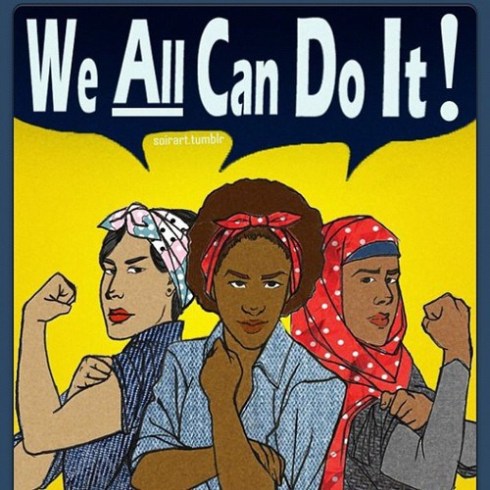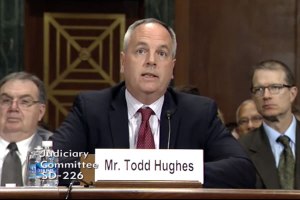Tag Archives: intersectionality
Today is National Coming Out Day!
Today is National Coming Out Day, which has been celebrated since 1988, on the first anniversary of the 1987 March on Washington for Lesbian and Gay Rights. HRC has put together a lovely video that highlights the many celebrities who have come out over the last 25 years, including one I have characterized as the most memorable to me, Ellen Degeneres. It also includes a diverse list of celebrities who are now out of the closet such as George Takei, Jason Collins, Jason Lambert, Wanda Sykes, Chaz Bono and Ricky Martin.
Filed under Ron Buckmire
You will be visible.
Hancock’s text, “Intersectionality to the Rescue” gives an analysis of how societal constructions such as race, gender and class, often assumed as disjoint discriminations, are actually intertwined into the identity of many individuals in society, and should therefore be considered as intersecting in order to understand and solve human rights issues. Going from the assumption that human beings create a set of codes and rules to understand and function in the world they live in, on which the theory of intersectionality lies, it comes as a natural consequence that those who don’t follow those rules or who don’t “belong” to the majority because of their difference are disfavored, and outed of the system through the use of unfair policies and covert discrimination. But more often than not, we think of discrimination as an act of hatred towards one particular group of people, “Gays”, “Blacks”, “Women”, “Latinos”, etc; without thinking about the fact that some people belong to more than one of these groups. Moreover, different types of injustice can be found within these minorities too. Homophobia in the Black community for example. So what happens to the Lesbian Latina? This is where intersectionality becomes the most relevant. “This moment of convergence – the simultaneous attention to race and gender – produced solidarity instead of the Oppression Olympics”. When this happens, social categories are no longer mutually exclusive, and different groups of people actually come together as one to fight the injustice that is aimed at them; the LGBT meet the Latinos to fight the system. And as our world becomes more globalized, it is to be expected that in the years to come, more people will be culturally diverse and consequently belong to different communities that may or may not have the same codes of conduct and political agendas. And the more that will happen, the more political and societal boundaries will fall and break as intersectionality becomes the “paradigm that shapes analyses of public education, social welfare policy, and immigration studies”. People through their identity, the similarity of their difference, their mixture, will become inseparable, tied to each other by intersectionality, bound to fight injustice together and destroy a system that has efficiently blended discrimination and institutional marginalization for centuries. And eventually, everyone will be seen, everyone will be visible; you will be visible.
Filed under axeptem
Intersectionality: An Openly Gay Federal Appellate Judge!?
This post is cross-posted from my personal blog, The Mad Professah Lectures
Todd Hughes made history today as the first openly gay person to be approved by the United States Senate to become a federal judge on a federal appellate court, just one level below the United States Supreme Court. The
United States Senate voted 98-0 to confirm President Barack Obama‘s nomination of Hughes to a lifetime appointment on the U.S. Court of Appeals for the Federal Circuit, becoming the highest ranked openly LGBT judge
in the country.
HRC (Human Rights Campaign), the country’s largest LGBT political advocacy organization, sent out a press release:
WASHINGTON – Today the United States Senate by a vote of 98 to 0 confirmed Todd Hughes to serve as a judge on the U.S. Court of Appeals for the Federal Circuit, making him the first openly-gay person to serve as a federal appellate judge. President Obama nominated Hughes, who is currently a Deputy Director in the Civil Division of the United States Department of Justice, in February and his nomination was approved by the Senate Judiciary Committee in July by a voice vote.
“Judge Hughes is a remarkably qualified jurist who has served his country tirelessly, and today that commitment to service made history,” said Human Rights Campaign (HRC) president Chad Griffin. “As an openly gay man takes to the federal appellate court bench for the very first time, barriers to achievement for the next generation of LGBT young people are crumbling every day.”
HRC urged President Obama to nominate Hughes and has strongly supported his confirmation by the Senate. He has served at the Justice Department for nearly thirty years and is a recognized expert in government pay and personnel law, whistleblower claims, international trade litigation and veterans’ benefits claims. He has personally argued over 50 cases before the Federal Circuit in multiple areas of the court’s jurisdiction, including appearances before the en banc court.
Hughes graduated from Duke University School of Law and served as a law clerk to the Honorable Robert B. Krupansky on the United States Court of Appeals for the Sixth Circuit.
The Federal Circuit is based in Washington, D.C. and, uniquely among federal appeals courts, has nationwide jurisdiction in a variety of subject areas, including international trade, government contracts, patents, trademarks, certain money claims against the United States government, federal personnel, veterans’ benefits, and public safety officers’ benefits claims.
Hughes becomes the eighth openly-gay federal judge with a lifetime appointment to the bench, including seven federal district court judges who were nominated by President Obama: Nitza I. Quiñones Alejandro, Pamela Ki Mai Chen, Michael Fitzgerald, Michael McShane, Alison Nathan, and Paul Oetken. They joined Judge Deborah Batts of the Southern District of New York, who was nominated by President Clinton in 1994 and took senior status in 2012.
Another historic first! Amazing to think that from 1992 to 2011 there was exactly one openly gay federal judge who had been approved by the Senate. Two years later, there are eight! Do you think an openly LGBT Supreme Court justice is possible within your lifetime? Take the poll!
Filed under Ron Buckmire


